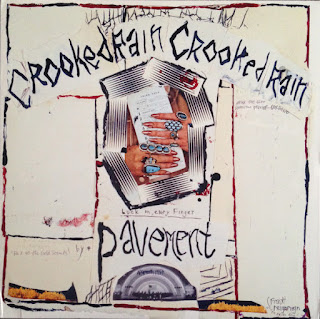The Strokes - Room On Fire (Album Review)
The Strokes - Room On Fire
(2003)
My copy: 2003 press by RCA and BMG.
When your band becomes immensely famous before your first LP even releases, it creates an obvious, and heavy pressure to keep the momentum flowing. The expectations felt by the Strokes to follow the revival-inducing Is This It? with something worthwhile must have been grossly intimidating to say the least. Fortunately, bandleader Julian Casablancas understood that owning and doubling down on the band’s fashion-forward, bad-boy style was just what the world needed from alternative rock’s new poster-children.
And yet, the emotional desperation of the lyrics and vocals in “What Ever Happened?” show a different side of Casablancas; one where the pressure builds up in the form of snappy, intertwined tremolo guitar and bursts into moodier melodies than they were typically known for. Though the music is sharper, the demeanor more abrasive and seemingly too-cool-to-care, it succeeds in these moments of nervous honesty. Room On Fire is an album with high peaks - “Reptilia” is a far better smash hit than “Last Nite,” embracing rhythmic angst and a drunken, almost threatening vocal performance that never would have fit on Is This It?
“Automatic Stop,” co-written by guitarist Albert Hammond Jr., is an interesting little piece of indie-rock/reggae fusion but strays from their new, vaguely dangerous image. “12:51” retreats even further into cutesy synth-guitar melodies but Casablancas’s slacker energy makes it work. The genuine distress felt in the performances before the cathartic chorus of “You Talk Way Too Much” contrasts the sweetness of earlier material, with “Between Love & Hate” reinforcing this new abandon for love songs. “Meet Me In The Bathroom” tackles hedonism, though in a melancholy light. The dueling guitars are as integral as ever, their woven chords driving the mid-tempo Sunday-morning romance of “Under Control.”
It takes a bit too long for “The Way It Is” to get catchy, but “The End Has No End” makes use of synth-guitar leads again for ear-worm melodies, now juxtaposed against more emotional clawing from Casablancas. It’s poetically fitting for the album to end with a song like “I Can’t Win” which is surely metaphorical for the band’s position in the public eye, closing the album with more strained pleading and a lack of resolution.
Room On Fire takes what made Is This It? an instant classic and warped it with a healthy dose of human insecurity. On the surface, the Strokes are cooler than they’ve ever been, with more solos and edgier performances. But the underlying emotion is what gives this album a soul, though it is less thematically consistent than Is This It? At the end of the day, the albums are on equal footing: and arguments about which is better will never truly have an end.




Comments
Post a Comment